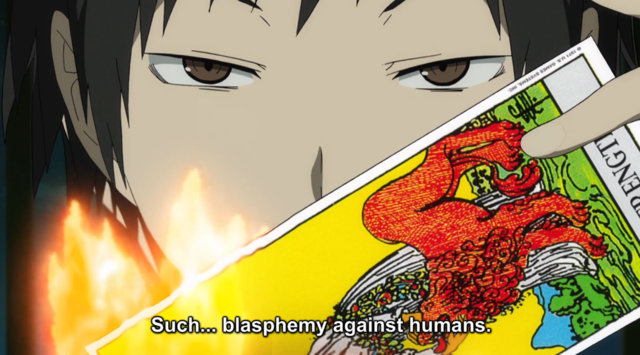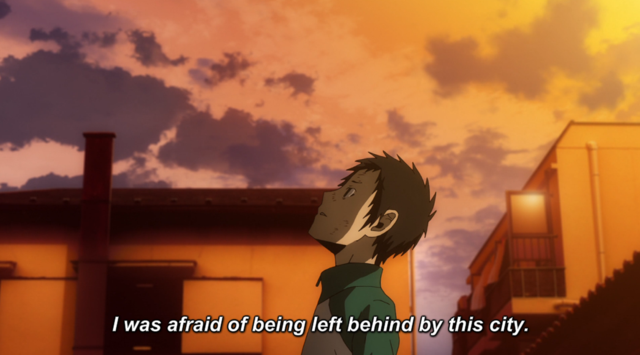In its 50+ episode run, particularly in the twenty or so episode that have made up Durarara!! x2, Durarara!! has demonstrated
a rather impressive ability to maintain a largely impregnable nature,
both in terms of plot and character motivations. While the outlines of
the character beats and story movements are at least accessible,
plunging into the depths of why certain characters act certain ways or
(heaven forbid) where the story is actually going, if anywhere, is a
venture most watchers of the show will admit is challenging and perhaps
even impossible. I'm no exception to this kind of general bafflement
with the contortions of the show, having been fooled time and time again
into thinking I'd finally seen where Durarara!!'s endgame lay.
It's been frustrating, I'll admit, but one thing that I have
noticed—particularly within the winding nonsense of x2—is that
there do seem to be a few dualities and themes that have cropped up
again and again, even as the plot has knotted and tangled itself beyond
any sort of reasonable rationality.
Of these, the most prominent (and, I think, most relevant to what Durarara!! actually
seems to be interested in musing on) are the dynamics between children
and adults, the interplay between the human and the inhuman, and the
tension between secrecy and openness.
In episode thirty of Durarara!! X2 The Third Arc, our dearly
hated friend Izaya Orihara makes a short monologue about removing the
"non-humans" from what he sees as his personal chessboard—Ikebukuro.
Among these he counts Anri Sonohara (a host for the sentient sword
Saika), Kasane Kujiragi (another Saika wielder), Celty Sturluson (a
dullahan), and his long-time rival Shizuo Heiwajima. In doing so, he
also specifically highlights the humanity of Mikado Ryuugamine (and, by
association, Masomi Kida), drawing a clear line between his human loves
and the "monsters" whose unique powers and capabilities place them
largely outside of his ability to control.

But, of course, the distinctions that Izaya draws are largely arbitrary—as are those others impose on the weirder figures of Durarara!!.
Shizuo is often referred to as a "monster," but we know he's really
nothing more than a human with inhuman strength. He has friends, a job,
feelings, and motivations. To call him a non-human on account of his
physical power reveals a fascinating bias within Izaya's human-centric
ideology and, in fact, calls into question the validity of
compartmentalizing humans and "monsters" with clear certainty. Of
course, as far as Izaya and Shizuo go, there's a lot of bad blood there,
so perhaps Izaya's not the best source for objective opinions (as if
his sociopathic tendencies weren't enough to clue you in on that
already). But, alternately—why does Izaya despise Shizuo so much?
Perhaps it's because of how radically Shizuo disrupts the easy
distinctions Izaya wants to draw between the human and the not.
By way of contrast, let's take Mikado—who Izaya, at least, explicitly
considers a human—as an example. Mikado since the ending of the
original Durarara!! (and Kida's corresponding departure) has
been one hell of a mess, wandering aimlessly about before beginning his
association with Aoba in back in the first season of x2 and
even more still after that. But thanks to Chikage's brutal dismissal of
him at the end of that season and his worries over Anri and Kida, he's
slowly grown into a someone dangerous despite his harmless exterior
demeanor—enough so that even the city's yakuza, who generally turn a
blind eye to the childish antics of the color gangs, have taken note of
him. Although he comes from the other direction as Shizuo, Mikado
likewise blurs the lines between the human and the monstrous—and I
suspect we've yet to see how far down the path of darkness he's really
gone.
Before moving on, I'd be lax to not note that this intersection of
humanity and monstrosity is not simply limited to Shizuo and Mikado;
it's in fact a dynamic present in many of Durarara!!'s other
characters. From Celty's humane love for Shinra balanced against her
mythical nature to Varona's merciless drive for power evaporating in the
face of Shizuo's strangely normal side to Ruri Hijiribe's idol/serial
killer personas, this duality exists throughout the show.

The child vs. adult theme doesn't exist separately from the human vs.
monster theme, and its further tied up in the show's obsession with
secrets. Although the first two ideas certainly aren't perfectly
analogous (you can't say childhood=humanity and adulthood=monstrosity so
easily), the moments where they line-up are plentiful. Consider Mikada
and Shizuo in contrast again: where Mikado, the teenager, hides behind
screens and manipulation to execute his own brand of inhumanity, Shizuo,
the adult, lives his out in the open. For an even clearer example,
consider Aoba and his brother Ran—the former again hides in the shadows,
while the latter lives out his nasty, monstrous life in the open. Or,
we have the difference between the yakuza (a vicious, confident,
organized adult group) and the Dollars (anonymous, fractured, and
childlike). The Dollars began as a fantasy for a naive Mikado, a way for
him to access the monstrosity of the city without really engaging with
it. Unfortunately for him, Ikebukuro is a monster—an uncontrollable,
amporphous, dangerous mass—and so the only way to keep up with it is to
become more like a monster himself. But Mikado's got friends, humans he
cares about, so he can't allow Anri and Kida to see him taking this
path. Thus, secrets.
Again and again throughout Durarara!!, secrecy is associated
with childhood and transparency with adulthood. In the show's terms,
the only real adults are the ones who have come to terms with the
monsters within themselves and have learned to live with them. Consider
Kasane Kujiragi as a foil to Anri on these terms. Kasane doesn't have
Anri's qualms about using Saika; she conducts "business," as she terms
it, with her blades. She lives openly with her own monstrosity. But does
this make Kasane less (or more?) than human? I don't think so. Ditto
Shizuo. Ditto Celty, and many other characters in Durarara!!. The human exists right alongside the monster.
One might come to the end of this and wonder if Durarara!! is,
then, a show fundamentally pessimistic on the idea of humans. If all of
us have secret monstrosity inside us that we either hide for better or
worse, or live out openly, do the more human parts of us even have a
chance? Or will we, like Celty, be consumed suddenly in a dark ball of
instinctual rage? To that end, I suppose much relies on the ending of Durarara!! x2 and
where Mikado, Kida, and Anri ultimately end up. Will Mikado pull the
trigger? Will Kida be able to face up to the monster of his own
insecurity to stop his friend? Will Anri overcome her worries to pull
the two boys together? The outcome of this arc will tell us whether Durarara!! believes we can be humans despite our monstrous urges or if it thinks we will become monsters despite our human natures.
skip to main |
skip to sidebar
Site Friend
Popular Posts
-
In its 50+ episode run, particularly in the twenty or so episode that have made up Durarara!! x2 , Durarara!! has demonstrated a rather ...
-
Raira Academy. Career Guidance Room. “Sonohara. You’re not furthering your education?” A few months into her second year of high school. ...
-
Mikado Ryūgamine (竜ヶ峰 帝人 Ryūgamine Mikado?) Voiced by: Toshiyuki Toyonaga (Japanese), Darrel Guilbeau (English) Online Alias: "Tarō...
-
Celty Sturluson (セルティ ストゥルルソン, Seruti Sutoruruson), also known as "The Black Rider" of "The Headless Rider", is a Dulla...
-
Anime publisher Aniplex of America, today announced that the English dub of its upcoming anime series, “Durarara!! X2," would be mak...
-
Episode 3 of Ketsu is a very dialogue heavy episode . It lacks any of the real action of the last few episodes and exists mostly to give ...
-
Durarara!! is a 2010 anime series directed by Takahiro Omori and produced by Brain's Base. The episodes are adapted from the light novel...
-
So I've been doing some digging to find some asexual manga or characters. Not all of them are canonly asexual, but they have shown sign...
-
Durarara is a show about a magical fairy who rides a motorcycle and saves people. This is both the most literal and least representative des...
-
Hey, So it is already a few months ago that i have post something, But i haven't stopped drawing. This week i will post my last drawin...
Recent Posts
Categories
Blog Archive
Download
Powered by Blogger.
Ads 468x60px
About Me
Followers
Featured Posts
Social Icons
TEXT WIDGET
Blogroll
Copyright © 2011 Anri Sonohara | Powered by Blogger
 01:26
01:26
 Unknown
Unknown

 Posted in:
Posted in: 

0 comments:
Post a Comment